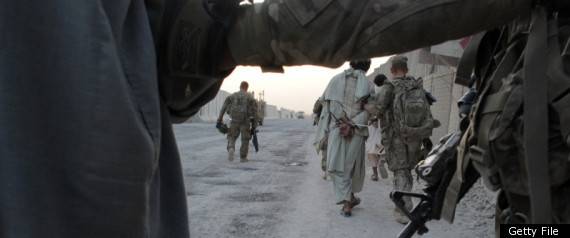Is China Freeloading Off The U.S. Military's Work In Afghanistan And Iraq?

Is China Freeloading Off The U.S. Military's Work In Afghanistan And Iraq?

Chinas limited support for the US-led counterinsurgency campaigns in Afghanistan and Iraq, despite the growing Chinese economic stake in these countries, has provoked some irritation among US observers over Chinas free riding on the back of dead European, American, and Afghan or Iraqi soldiers. S. Frederick Starr, chairman of the Central Asia-Caucasus Institute, caught the mood well when he said some might see it as, We do the heavy lifting And they pick the fruit.
The Chinese government for its part has continued to reject suggestions that it contribute combat forces to the NATO-led International Security Assistance Force (ISAF) seeking to pacify Afghanistan. China has also dismissed inquiries about whether NATO could send supplies, even only non-lethal ones such as food and clothing, through Chinese territory to Afghanistan to support the coalition militaries there.
Chinas security ties with Afghanistan resemble Beijings policies in Iraq, which have focused on investing in the Iraqi energy sector while shunning any major security role. In both Afghanistan and Iraq, Chinese policy makers are ambiguous about the US military role. They certainly dont want Islamist extremists to triumph there, since they could then use these territories to attempt to spread extremism throughout China. Chinese officials have also traditionally avoided challenging the United States on core security issuesand the Obama administration has clearly identified the Afghan and Iraqi wars as two of them.
Having the Americans take the lead in fighting Islamists insurgents in Afghanistan and Iraq also relieves China of having to fight them directly. Chinese policy makers prefer that the United States and its allies bear the burden of countering radical Islamist movements outside of China, especially as alarm grows at how Islamist extremists are depicting their policies in Xinjiang as anti-Muslim.
Yet, while Chinese leaders dont challenge the legitimacy of the US military operations in Afghanistan or Iraq, and indeed want the United States to continue to fight Islamist terrorism and promote Afghanistans and Iraqs economic and political reconstruction, they dont support maintaining a long-term Western military presence in these countries. Given these conflicting pressures, the Chinese government has publicly supported the Afghan and Iraqi governments, but sought to distance itself from the US-led counterinsurgency campaigns in both countries, as well as refraining from endorsing any lengthy Western military presence in these regions.
But although Chinese policy makers have excluded a Chinese military role in Afghanistan or Iraq, theyve encouraged Chinese companies to invest in developing these countries natural resources. Recent Chinese investment activity has concentrated on gaining access to raw materials and developing the infrastructure required to transport these goods to China.
To focus on Afghanistan, after its government opened its energy, mineral, and raw material sectors to foreign investment in 2007, China rapidly became Afghanistans largest foreign investor with the surprise purchase by the Metallurgical Corporation of China (MCC) of a controlling stake in the Aynak copper field. According to the Afghanistan and British Geological Surveys, the Aynak copper deposit, located 35 kilometres south of Kabul at the northern end of Logar Province, contains 240 million tons of material with a grade of 2.3 percent copper in the central portion of the deposit. The November 2007 bid of more than $3 billion made that transaction the single largest foreign direct investment in Afghanistan. The state-owned MCC could offer a package of benefits that its private sector competitors couldnt match, and in July 2009, MCC and Jiangxi Copper Co. started development work at the mine.
Subsequent revelations of vast untapped mineral resources in Afghanistan have undoubtedly peaked Chinese interest in developing rail connections and related commercial infrastructure in Afghanistan. According to recent reports, US geologists have rediscovered around $1 trillion of iron, copper, cobalt, and lithium reserves scattered around Afghanistan, including the Taliban-strong southern and eastern regions along the border with Pakistan. Pentagon officials believe the mineral resources will help transform conflict- ridden Afghanistan into a modern industrial state. According to the Chinese government, Chinese firms were engaged in 33 infrastructure projects (such as road construction) in Afghanistan in 2008, valued at almost half a billion dollars, in addition to the Aynak copper investment. However, a difficult political situation, bad roads and the lack of railroads prevent exploitation and shipment of these resources to markets.
China provides modest development aid to Afghanistan, supporting construction of hospitals and schools as well as other reconstruction projects. Since 2002, when the new post-Taliban government was formed, China has converted all Afghanistans existing debts to China and provided more than 900 million yuan (about $130 million) in additional reconstruction assistance to the country. In addition, the Chinese government has already pledged an additional $75 million over the next five years. For example, millions of dollars have supported an irrigation complex at Parwan, Jamhuriat Hospital in Kabul, and a conference hall in Karzais presidential palace. Since July 2006, moreover, China has allowed hundreds of Afghan products to enter China without tariffs. In addition, China has trained more than 500 Afghan officials in a range of areas, ranging from diplomacy to counternarcotics to agriculture and health care.
Is China Freeloading Off The U.S. Military's Work In Afghanistan And Iraq?

